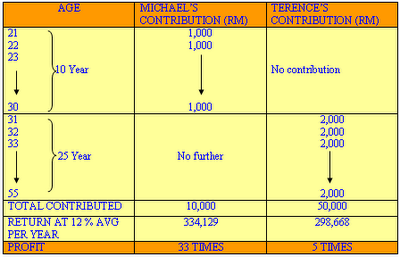Gaya Hidup Selepas Pencen
MEMBUAT anggaran berapa jumlah wang yang diperlukan untuk menikmati kehidupan persaraan yang tidak membebankan bukanlah perkara mudah. Namun, kita boleh melakukannya bersandarkan beberapa garis panduan.
Sebagai permulaan, bandingkan jumlah diperlukan dengan pendapatan atau gaji yang diperoleh sekarang.
Sebagai permulaan, bandingkan jumlah diperlukan dengan pendapatan atau gaji yang diperoleh sekarang.
Sebagai contoh, jumlah pencen bulanan pekerja sektor awam ialah 50 peratus daripada gaji akhir pekerja.
Maksudnya, sasaran pendapatan ketika bersara ialah setengah daripada gaji ketika bekerja. Kalau gaji kita RM3,000 sebulan, ketika pencen kelak akan mendapat pendapatan RM1,500 sebulan.
Maksudnya, sasaran pendapatan ketika bersara ialah setengah daripada gaji ketika bekerja. Kalau gaji kita RM3,000 sebulan, ketika pencen kelak akan mendapat pendapatan RM1,500 sebulan.
Cara ini membolehkan kita membuat perbandingan gaya hidup selepas bersara dengan gaya hidup sekarang.
Satu lagi cara, dengan mensasarkan jumlah diinginkan ketika bersara dan sebagai contohnya, sebanyak RM500 sebulan atau RM1,000 sebulan iaitu jumlah yang dianggarkan mencukupi berdasarkan gaya hidup kita.
Selepas sasaran ditetapkan, buat pula anggaran jangkaan hayat kita. Walaupun hal ini adalah ketentuan Tuhan, namun kita perlu juga merancang kerana jika umur panjang bagaimana hendak meneruskan kehidupan selepas ini.
Kita boleh menggunakan jangkaan hayat rakyat Malaysia sekarang ini iaitu antara 70 hingga 80 tahun. Ini bermakna kita mungkin hidup selama antara 15 hingga 25 tahun selepas mencapai umur 55 tahun.
Berdasarkan sasaran pendapatan bulanan dan jangkaan hayat, dapatlah kita mensasarkan jumlah wang yang diperlukan ketika bersara.
Apa pula faktor yang perlu diambil kira dalam menganggarkan perbelanjaan ketika sudah bersara. Ketika kita masih bekerja, perbelanjaan paling besar ialah membesarkan anak-anak, kos pendidikan mereka, bayaran ansuran rumah dan kereta.
Perbelanjaan ini mungkin tidak lagi perlu dikeluarkan selepas bersara, jika kita merancang kehidupan dengan rapi. Perbelanjaan lain seperti pakaian, pengangkutan dan pengangkutan dan makanan secara perbandingan adalah kecil.
Perbelanjaan yang paling besar selepas bersara ialah rawatan kesihatan kecuali jika kita sihat. Kemungkinan kita menghidap penyakit sama ada kritikal atau tidak sangat tinggi kerana usia kita yang semakin meningkat.
Source: Harian Metro


